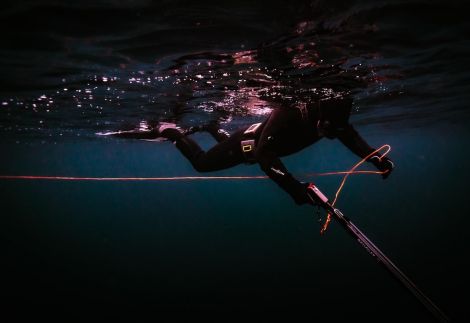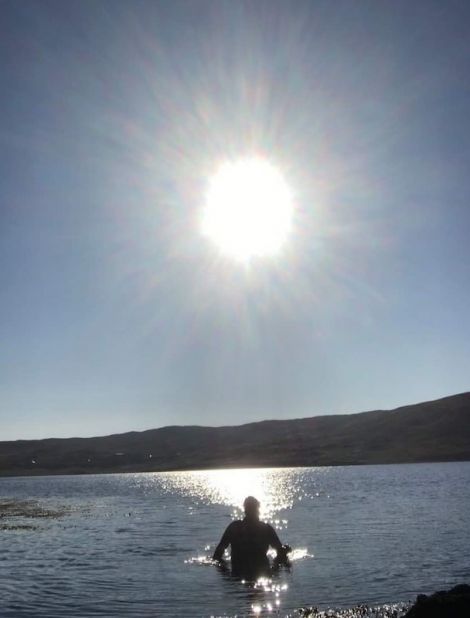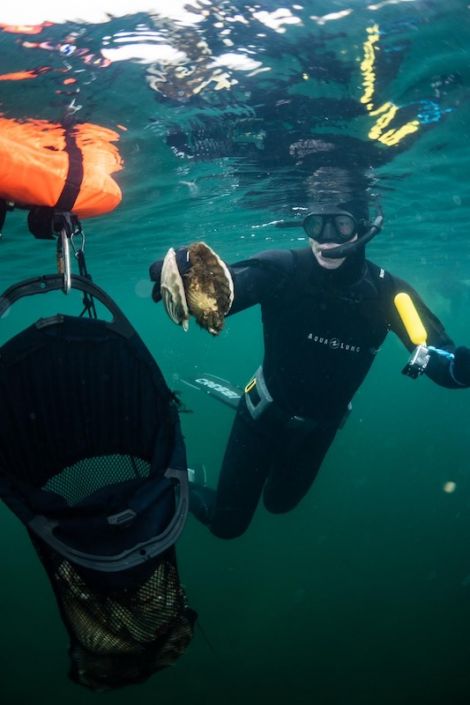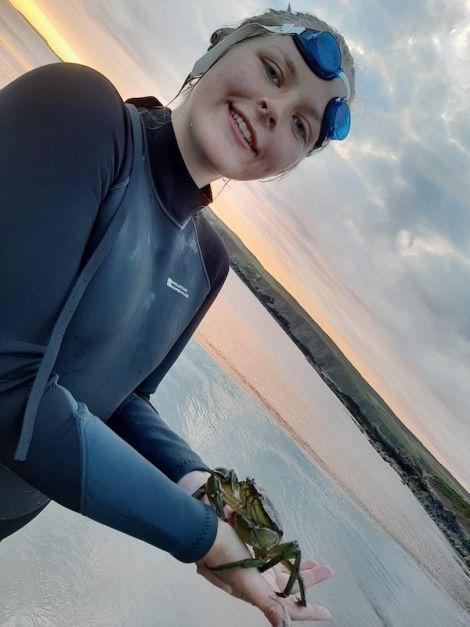Features / Diving into another world
Sea swimming has become a relatively recent recreational pleasure in Shetland but is rapidly growing in popularity
THE folk stories of old always warned of the dangers of the ocean, of sea monsters and sea witches luring unsuspecting boats to their doom or selkie folk who mysteriously shape shifted from seal to human form, writes Alex Purbrick.
But as the folk stories are no longer at the forefront of everyone’s minds and more people able to swim than before the sea has become less of a fearful place and more a place of respite away from the rush and demands of our fast-paced modern lives.
Sea swimming or ‘wild swimming’ has soared in popularity over the last couple of years with 7.5 million people going to open water and outdoor pools across the UK with many advocating the mental and physical health benefits of immersing into cold water, as well as connecting to nature and their local outdoor environment.
Jane Evans, 40, from Hillswick has been sea swimming since she moved to Shetland 13 years ago. “Sea swimming gives you head clarity that you don’t get doing anything else,” she says, “I much prefer swimming in the sea than an indoor pool and even though it’s a challenge getting into the water because its so cold, you have to remember to breathe and be willing to get your head in and go for it.”
Jane swims in the sea a few hundred yards from her house which she started doing during lockdown. “I was walking and cycling and I wanted to swim as well so I started going to this little beach below my house. I swam far enough out my feet couldn’t touch the bottom and I just floated.
“Tirricks were diving around me. I only heard the sound of the sea and I felt a million miles away from everything, yet I was only five minutes away from my house.”
Become a member of Shetland News
It is ironic that sea swimming should now be called ‘wild’. For urbanites desperate to escape the man-made madness of the inner city then swimming in the ocean could be their attempts to rewild themselves.
But in Shetland, surrounded by sea and wilderness, Jane desscribes ‘wild swimming’ as “just a buzzphrase”.
“For me it’s just what I do, swim in the sea. I think there’s such a disconnect now in people’s lives with nature and being exposed to the elements.”
However, sea swimming is not without its challenges. The swell and intense winter winds can very quickly turn the sea into a dangerous place.
Yet Nick McCaffrey, from Aith, loves sea swimming in the winter and feels it is easy to swim all year round in Shetland. One has, of course, “be aware of the currents, tides and weather conditions” but he “always finds somewhere to swim from the shelter of the wind. The most hindrance is the lack of light in the winter as on a grey day visibility is much darker under water.”
The 39-year old free dives around the coastline of Shetland, holding his breath as he swims under water marvelling at the sea life he encounters.
“A lot of people just free swim but I like free diving, exploring. That’s what interests me being in the water looking at the life down there. I go off in my kayak out to sea and then free dive,” he says.
“I forage for lobsters, crabs, and scallops when I’m free diving. There’s much less of an environmental impact foraging for these creatures this way, and you’re more selective in what you can pick up. There’s something quite pure about it all and you feel you’ve earned your dinner as well!”
Fortunately, the sea around Shetland is relatively moderate with temperatures ranging from 13 degrees Celsius in the summer and autumn to six degrees in winter.
Nick feels it’s much more enjoyable swimming in these temperatures with a decent wetsuit. He suggested anyone wanting to free dive buy a 5mm or 7mm wetsuit and said that “you can’t waste money investing in a good wetsuit, especially one with a hood built in to keep your head warm. Also buy gloves and boots as warm hands and feet make a big difference in how much you’ll enjoy your swim.”
For Nick the joy of free diving is in swimming underwater seeing first-hand the sea creatures all around him. He feels it is so much quieter than diving with oxygen tanks and a dry suit which hinder your ability to swim freely.
“Sea creatures come to look at you, curious as to why you’re there. Also, in winter the water is so much clearer because there isn’t so much plankton in the sea as there is in the summer. Free diving lets me see that underwater world in a way that sitting in a kayak doesn’t!”
Someone who often accompanies Nick on his sea swimming adventures is Hillswick teenager Kailee Tait. She has been sea swimming since she was a child, starting off bodyboarding and now wearing wetsuit and snorkel, swimming in deeper water.
“I first got my snorkel I was afraid to put my face under water,” she concedes “but now I like it.
“You feel like you’re in another world where you can see all the fish. I feel more free swimming in the sea. The cold water really helps my skin and hair, helps it feel less oily. I like swimming with the seals, gulls and tirricks in the summer. It relaxes you, makes you feel more alive, gives you energy.”
Kaillee like so many other people who sea swim find the sea therapeutic, a far cry from the days of old when the sea was a forbidding place.
It provides an endorphin rush “like no other” she smiles, “once you get out of the water you’re always thinking, when can I get back again!”
Become a member of Shetland News
Shetland News is asking its readers to consider paying for membership to get additional perks:
- Removal of third-party ads;
- Bookmark posts to read later;
- Exclusive curated weekly newsletter;
- Hide membership messages;
- Comments open for discussion.
If you appreciate what we do and feel strongly about impartial local journalism, then please become a member of Shetland News by either making a single payment, or setting up a monthly, quarterly or yearly subscription.












